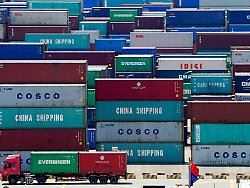Sunday 07 November 2021
Beijing’s foreign trade is booming
China’s interest in “Made in Germany” is stagnating
The second largest economy in the world reports a double-digit increase in exports for the 13th month in a row. Interest in foreign goods, on the other hand, is growing much more slowly. That suits the government.
China exported a surprising amount in October. The exports climbed by 27.2 percent compared to the previous year, as the customs authorities announced. At the same time, however, growth has slowed somewhat. Nevertheless, it is the 13th month in a row with export increases in the double-digit percentage range. Meanwhile, imports were weaker than expected – a sign that domestic demand is not excessively strong. They rose by 20.6 percent in October. In terms of value, China imported significantly more oil and coal, according to data from the investment bank Goldman Sachs.
In September exports from the world’s second largest economy had increased by a good 28 percent. Analysts had only expected an increase of 24.5 percent. The import increase at that time was 17.6 percent.
In October, China again bought remarkably little from Germany. The corresponding imports fell by 5.1 percent over the year. China’s exports to Germany, on the other hand, grew significantly with an increase of 42.5 percent.
China recorded a trade surplus of $ 84.5 billion in October. Analysts had expected a surplus of $ 65.6 billion. In September, China had a trade surplus of $ 66.8 billion.
Expert: Development gives government air
Zhiwei Zhang, chief economist at asset manager Pinpoint Asset Management, said strong exports offset domestic weakness and give the Beijing government leeway. “The government can now afford to wait until the end of the year to ease monetary and fiscal policy.” The exports ensured that the economic slowdown did not turn out too strong.
Economically, China got through the Corona crisis much better than many other countries. The price for this, however, was also a particularly rigid corona policy – including lockdowns for entire megacities.
Nevertheless, the prospects have not looked quite so rosy recently. 36 percent of German companies with foreign business stated in a DIHK survey that they expected a positive economic trend in China. In the spring, however, it was still 70 percent.
In the summer, the Chinese economy had only grown by 4.9 percent compared to the previous year. That was the lowest value since the third quarter of 2020. Despite all of the growth in exports, industry in the People’s Republic is suffering from delivery bottlenecks, too little coal and thus from a lack of energy and stricter climate protection requirements. Premier Li Keqiang recently said the government would take steps to shore up the industry.
